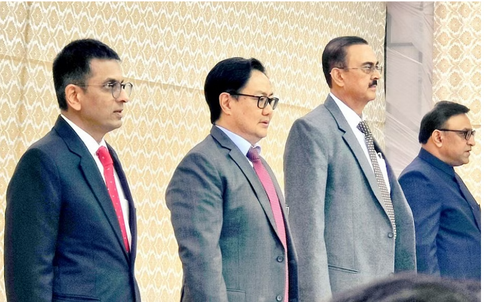The centre, it appears, has chosen to take on the Supreme Court instead of doing what is expected of it. The Supreme Court on Monday linked the failure of the National Judicial Appointments Commission (NJAC) to the Government ‘s willingness to “cross some Rubicons” and take on the judiciary by delaying implementation of collegium’s recommendations regarding appointment of judges to HCs and SC.
The NJAC was struck down by the apex court in 2015 thus reviving the collegium system. “There appears to be unhappiness in the government of the fact that NJAC, which gave the government an equal say in judicial appointments, did not muster the constitutional mandate” commented the top court. There is no doubt about it and the Government has not been hiding its unhappiness. Union Law Minister Kiren Rijiju, has been a relentless critic of the collegium system. He openly said the government is not happy about the judges appointing judges which system is in vogue only in India. It is, though, not judges appointing judges but judges recommend and the President of India appoints after the approval of the Centre. The centre has been sitting on the recommendations made by the collegiums for more than one and half years in some cases. Rijiju reportedly dared the judiciary to ‘issue its own notifications’ of appointments if it thought the Government was sitting on collegium’s recommendations. Rijiju said “Let them give the powers to us then, we have no difficulty.”
Rijiju has been harsh on the judiciary. He must be acting under instructions from the above. Otherwise, he would not have taken on the top judiciary with that kind of aggression and persistence. Justice Sanjay Kishan Kaul, one of the two-judge bench, the other being AS Oka, has said it in so many words. “This (Rijiju’s remarks) came from somebody high enough, it should not have” Justice Kaul shot back when the Law Minister’s comments were brought to his notice by Vikas Singh, senior advocate and president of Supreme Court Bar Association.
This was the high mark in the tensions simmering between Centre and the top judiciary. Rijiju has been criticizing the collegium system in public meetings. Supreme Court, not to be cowed down, said on November 11, “Government neither appoints the persons, nor communicates its reservations, if any, on the names (suggested by the collegiums). Keeping the names pending is something not acceptable.” On November 28, the apex court again said, “It is crossing some Rubicons by keeping these names pending like this. It cannot go on like this. We went on thinking that things will improve. But for the past two months, everything has come to a standstill, whether it is appointments to the HCs or to SC.”
As though in response to the SC’s comments, the Centre has on Monday asked the SC to reconsider 20 names recommended for appointment as High Court Judges. They include that of advocate Saurabh Singh who recently said his appointment was delayed as he was gay. He was one of the lawyers whose efforts in the SC had led to the decriminalization of homosexuality.
Rijiju has been the most irresponsible law minister that the country ever had. He was talking on the subject which was under the consideration of the court, which was hence sub judice. He was talking brazenly provoking the judiciary.
Squashing of NJAC was done because of some loopholes in the legislation made earlier. Instead of plugging the loopholes and bring about a fresh law, the centre has opted for confrontation with the judiciary. Rijiju should have advised the prime minister to enact a fresh law excluding the loopholes pointed out by the apex court while squashing NJAC. The SC never said a fresh law cannot be made. It is within Centre’s powers to approach the legislature with appropriate Bill. None holds any brief for collegium system. Many former judges and legal experts in the country consider that Justice Jasti Chelameswar was right when he dissented to the majority judgment on NJAC. Collegium system is not the panacia. At the same time the Government cannot make arbitrary appointments as it is appointing vice chancellors and election commissioners. They are bound to be ‘yesmen.’
There has to be a foolproof method for appointment of judges. It has to be done in such a way that the popular impression of judiciary would be enhanced and people’s faith in the courts of law is restored. The right royal way available for the Government is to go for a fresh legislation. The Government would do well to take up the task of curing the loopholes in the legislation brought earlier and go for new and pucca legislation to put an end to this unseemly controversy.




